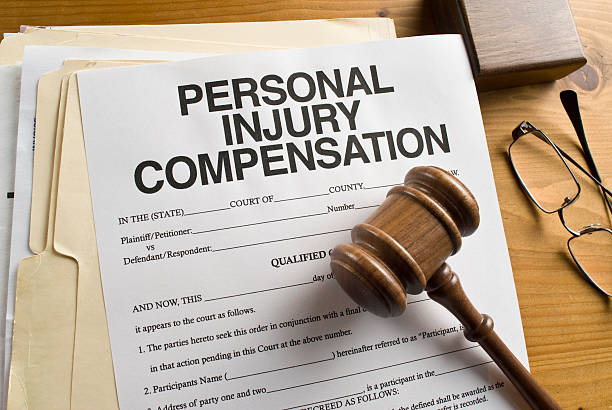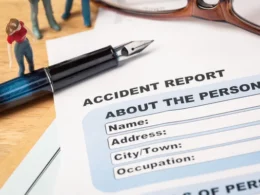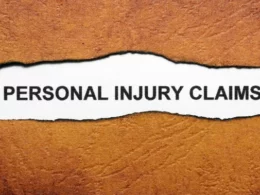If you’ve suffered a personal injury, you may be wondering how your compensation will affect your government benefits. While the answer varies depending on the type of benefit you receive, it’s important to understand the potential impact before accepting a settlement or award.
Nonetheless, this article is here to simplify it for you. Continue reading to find out if or how personal injury compensation affects benefits, as well as what to do.
What is Personal Injury Compensation?
Personal injury compensation is a monetary award given to a person who has been injured due to the negligence or intentional act of another person or entity. Compensation can be received for a variety of damages, including medical expenses, lost wages, pain and suffering, and property damage.
Compensation amounts can vary greatly depending on the injury’s severity, the damages’ extent, and the jurisdiction where the injury occurred.
In some cases, compensation can reach millions of dollars; in others, it may only cover a portion of the expenses incurred.
It is important to note that personal injury compensation is different from benefits received from government programs, such as Social Security Disability or Workers’ Compensation. Compensation is typically received from the at-fault party’s insurance company or through a lawsuit.
When pursuing personal injury compensation, it is important to work with an experienced attorney who can help you navigate the legal process and ensure that you receive the maximum compensation possible for your injuries.
How Does Personal Injury Compensation Affect Benefits?
Now you need to understand the relationship between personal injury compensation and benefits.
SSI and SSDI Benefits
If you receive Supplemental Security Income (SSI) or Social Security Disability Insurance (SSDI) benefits, your personal injury compensation may affect your eligibility for these benefits.
If your settlement amount or award is high enough, it could disqualify you from receiving SSI or SSDI benefits.
However, the impact on your benefits will depend on the amount of your compensation and the type of benefit you receive.
Medicaid Benefits
If you receive Medicaid benefits, your personal injury compensation may also affect your eligibility for this program.
Medicaid is a needs-based program, which means that your income and assets must fall below a certain level to qualify.
You may lose your Medicaid benefits if your settlement amount or award pushes your income or assets above this level.
Supplemental Security Income
Supplemental Security Income (SSI) is a needs-based program that provides cash assistance to disabled individuals with limited income and resources.
If you receive SSI benefits, your personal injury compensation may affect your eligibility for this program. Your compensation may be considered income for SSI purposes, which could reduce or eliminate your monthly SSI payments.
It is vital to note that the impact of personal injury compensation on your benefits will depend on a variety of factors, including the type of benefit you receive, the amount of your compensation, and the laws in your state.
Nevertheless, just make sure you consult with an attorney or other qualified professional to determine how your compensation may affect your benefits.
Understanding Income Limits and Resources
If you’re receiving Social Security benefits, you may be wondering how a personal injury settlement could affect your benefits. The answer depends on several factors, including your income and resources. This section will explore the income limits and resources that could impact your benefits.
FICA and Taxes
First, it’s important to understand that Social Security benefits are subject to FICA taxes. FICA stands for Federal Insurance Contributions Act, and it’s the tax that funds Social Security and Medicare.
If you receive a personal injury settlement, you may owe taxes on that income, which could impact your benefits.
SSI Income Limit
If you’re receiving Supplemental Security Income (SSI), your benefits are based on your income and resources. In 2023, the federal SSI payment standard is $794 per month for an individual and $1,191 for a couple.
Moreover, if you have other sources of income, such as a personal injury settlement, your benefits may be reduced or eliminated.
The SSI income limit is based on your countable income, which includes wages, self-employment income, and other unearned income.
Unearned income includes things like interest, dividends, and compensation from a personal injury lawsuit. If your countable income is above the SSI income limit, your benefits will be reduced or eliminated.
Special Needs Trust
If you’re receiving Social Security Disability Insurance (SSDI), a personal injury settlement is unlikely to impact your benefits.
However, if you’re receiving SSI and you receive a settlement, you may be able to protect your benefits by setting up a special needs trust.
A special needs trust is a legal arrangement that allows you to set aside money for certain expenses without affecting your eligibility for SSI. The trust must be set up and managed properly to ensure that it complies with Social Security rules.
Overall, it’s important to understand how a personal injury settlement could impact your Social Security benefits. If you’re receiving SSI, your benefits may be reduced or eliminated if your countable income is above the SSI income limit. If you’re receiving SSDI, a settlement is unlikely to impact your benefits. Consider consulting with a qualified attorney or financial advisor to help you navigate these complex issues.
Lost Wages and Professional Advice
In some situations lost wages need to be accounted for when seeking personal injury compensations. Here’s what you should know.
Lost Wages
If you have suffered a personal injury, you may have to take time off work to recover. This can lead to lost wages, which can be a significant financial burden.
However, you may be able to recover these lost wages as part of your personal injury compensation. The compensation you can claim for lost wages will depend on several factors, including the severity of your injuries, how long you were off work, and your pre-injury earnings.
It is important to keep accurate records of your lost wages, including any sick leave or vacation time you had to use.
Hiring a Personal Injury Lawyer
If you are considering making a personal injury claim, it is important to seek professional advice from a personal injury lawyer. A lawyer can help you navigate the complex legal process and ensure that you receive the compensation you are entitled to.
A personal injury lawyer can also help you calculate your lost wages and ensure that you receive fair compensation for them. They can help you gather the necessary documentation, such as pay stubs and medical records, to support your claim.
Make it a priority to choose a personal injury lawyer who has experience in handling cases similar to yours. Look for a lawyer who has a good track record of success and who is willing to work on a contingency fee basis, which means they only get paid if you win your case.
Overall, if you have suffered a personal injury and have lost wages as a result, you may be entitled to compensation. It is important to keep accurate records of your lost wages and seek professional advice from a personal injury lawyer to ensure that you receive fair compensation.
Quality of Life Changes and Medical Bills
Another factor to take into account is the quality of life changes and medical bills.
Pain and Suffering
If you have suffered a personal injury, you may be entitled to compensation for your pain and suffering. Pain and suffering damages are intended to compensate you for the physical and emotional distress caused by your injuries. This compensation is separate from any economic damages, such as medical bills or lost wages.
Mental Anguish
In addition to physical injuries, personal injuries can also cause mental anguish, such as depression, anxiety, or post-traumatic stress disorder (PTSD). If you have suffered mental anguish as a result of your personal injury, you may be entitled to compensation for your emotional distress.
Quality of Life Changes
Personal injuries can also cause significant changes to your quality of life. For example, you may be unable to perform daily activities or enjoy hobbies that you once enjoyed.
These changes can have a significant impact on your overall well-being and happiness. If your quality of life has been negatively affected by your personal injury, you may be entitled to compensation for these changes.
Medical Bills
Personal injuries can result in significant medical bills. If you have been injured, you may be entitled to compensation for your medical expenses, including hospital bills, doctor’s visits, and other medical treatments. It is important to keep track of all of your medical expenses, as they may be used to calculate your compensation.
Overall, personal injury compensation can help to ease the financial burden caused by your injuries and may help you to recover more quickly. However, it is important to consult with an experienced personal injury attorney to determine how your compensation may affect your benefits.
Insurance Companies and Social Security Disability Benefits
Insurance companies and social security disability benefits is a factor to consider when it comes to personal injury compensation.
Social Security Disability Insurance
If you are receiving Social Security Disability Insurance (SSDI) benefits, a personal injury compensation award will generally not affect your benefits.
SSDI benefits are based on your employment history, not your financial circumstances. Therefore, if you receive a personal injury compensation award, it will not affect your SSDI benefits.
Insurance Companies
Insurance companies may have an impact on your Social Security Disability (SSD) benefits. If you receive a personal injury compensation award from an insurance company, it may be considered income by the Social Security Administration (SSA).
If the award is considered income, it may reduce your SSD benefits. However, not all personal injury compensation awards will be considered income by the SSA. For example, if you receive a settlement for pain and suffering, it will not be considered income by the SSA.
Additionally, if you receive a settlement for lost wages, it may not be considered income by the SSA if it is for a period of time that is covered by your SSDI benefits.
Please note that insurance companies may have different rules and regulations regarding personal injury compensation awards.
Therefore, it is important to speak with an experienced attorney to determine how your compensation award may affect your SSD benefits.
To summarize this, you are receiving SSDI benefits, a personal injury compensation award will generally not affect your benefits. However, insurance companies may have an impact on your SSD benefits if the compensation award is considered income by the SSA. It is important to speak with an experienced attorney to determine how your compensation award may affect your SSD benefits.
Nursing Home Care and Skilled In-Home Care
If you have been injured and are receiving personal injury compensation, you may be wondering how it will affect your ability to receive nursing home care or skilled in-home care. Here is what you need to know:
Nursing Home Care
If you are currently receiving nursing home care, your personal injury compensation may affect your eligibility for Medicaid. Medicaid is a government program that helps pay for nursing home care for people who cannot afford it themselves.
In order to qualify for Medicaid, you must meet certain income and asset requirements. If you receive a large settlement or award from a personal injury case, it could put you over the income or asset limit, making you ineligible for Medicaid.
Nevertheless, it is important to note that not all personal injury compensation is counted as income or assets for Medicaid purposes. For example, if your settlement or award is for pain and suffering or emotional distress, it may not be counted. It is important to speak with a qualified attorney or financial advisor to determine how your personal injury compensation will affect your Medicaid eligibility.
Skilled In-Home Care
If you are receiving skilled in-home care, your personal injury compensation may also affect your eligibility for Medicaid.
However, in-home care is generally less expensive than nursing home care, so you may be able to continue receiving in-home care even if your settlement or award makes you ineligible for Medicaid.
Furthermore, if you are receiving in-home care through Medicare, your personal injury compensation will not affect your eligibility.
Medicare is a federal health insurance program that covers certain medical expenses for people over the age of 65, as well as people with certain disabilities. If you are eligible for Medicare and receiving in-home care, your personal injury compensation will not affect your coverage.
It is important to speak with a qualified attorney or financial advisor to determine how your personal injury compensation will affect your eligibility for Medicaid or other government programs.
Conclusion
Personal injury compensation can impact your benefits in various ways. If you receive a lump sum settlement, it may affect your eligibility for Medicaid, Supplemental Security Income (SSI), and food stamp programs. However, Social Security Disability (SSD) benefits are generally not affected by personal injury settlements.
If you are currently receiving government benefits, it is important to consult with an attorney or a financial advisor before accepting a personal injury settlement. They can help you understand how the settlement may affect your benefits and provide guidance on how to protect your eligibility for government assistance programs.
It is also important to note that the impact of a personal injury settlement on your benefits can vary depending on the specific terms of the settlement. For example, if the settlement includes compensation for lost wages, it may be considered income and could affect your benefits. However, if the settlement is for pain and suffering, it may not be considered income and may not affect your benefits.
Overall, it is important to carefully consider the potential impact of a personal injury settlement on your benefits before accepting any offers. Seek professional advice and make an informed decision based on your individual circumstances.
YOU SHOULD ALSO READ:
- Road Traffic Personal Injury Claims: A Comprehensive Guide
- Can You Get Legal Aid for Personal Injury Claims? Explained
- Personal Injury Claim Medical Examination: What to Expect and How to Prepare
- Personal Injury Claim: What You Need to Know About Broken Ankle Cases
- Personal Injury vs. Medical Negligence: Understanding the Key Differences












